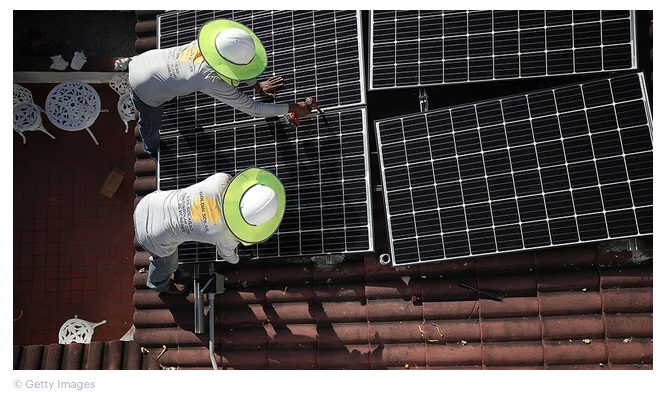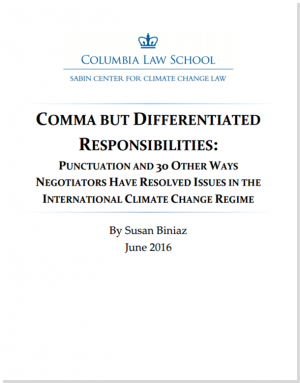by Ken Zhong
JD Candidate, Columbia Law School
On July 14th, 2011, Texas-based renewable energy developer Mesa Power Group, owned by billionaire T. Boone Pickens, initiated a complaint against Canada under the North American Free Trade Agreement (NAFTA). The complaint alleges that Ontario arbitrarily instituted a rule change in June to disfavor Mesa, and that Ontario’s Feed-In Tariff (FIT) program violates NAFTA. The FIT program provides subsidies to producers of renewable energy so long as the energy is produced using 60 percent locally sourced goods and services.[i] The FIT program is designed to incentivize local investment in renewable energy manufacturing by offering a benefit to energy producers who invest in locally manufactured solar panels and other equipment.[ii] Local manufacturers of such equipment would thus gain a competitive advantage over foreigners, as the favorable FIT rates could make up for less competitive pricing of their products. Mesa’s complaint also challenges the “preferential treatment” given to certain investors, noting Ontario’s $7 billion contract with Samsung that includes over $400 million in subsidies.[iii]
Mesa has already started work on two wind projects in Canada. Since wind turbines are constructed in specific high-wind locations that can be far from electrical grids, it is crucial for wind companies to receive access to electricity transmission hookups. On June 3rd, 2011, the Ontario Power Authority (OPA) changed a rule to allow projects from a neighboring transmission region to connect to the region Mesa was operating in.[iv] As a result, Mesa did not receive the energy contracts it was seeking. Mesa claims that OPA arbitrarily changed the rule to favor Canadian wind companies. Chapter 11 of the NAFTA contains a clause that allows private companies to bring a claim against a member nation before an ad-hoc arbitration panel.[v] Mesa has stated that it intends to file a formal Notice of Arbitration using this mechanism later this year.
In its filing, Mesa alleges that Canada has violated NAFTA Article 1102, which states that “[e]ach Party shall accord to investors of another Party treatment no less favorable” than what it accords to other parties. Other alleged violations include Articles 1103, 1105, and 1106. Article 1103 prohibits favorable treatment to non-NAFTA parties in like circumstances. Article 1105 guarantees nondiscriminatory treatment to investors of another Party, which OPA may have violated with its last minute rule changes. Article 1106 sets certain investment and trade rules that may prohibit the “local buy” requirement of Ontario’ FIT program.[vi]
Ontario’s FIT program has already generated complaints under other international trade agreements. On September 13th, 2010, Japan filed a claim with the World Trade Organization (WTO) alleging that the Ontario FIT program violates provisions of the Agreement on Subsidies and Countervailing Measures. Japan argues that under various provisions of the WTO, the FIT program’s “local buy” requirement discriminates against “like products” from foreign countries and thus constitutes a prohibited subsidy.[vii]
Ontario’s FIT program is not the only green energy subsidy that has come under attack over free trade concerns. Last fall, the United States initiated a WTO dispute against China alleging that the country’s subsidies to domestic wind energy manufacturers violate WTO agreements. China’s subsidies under the Special Fund for Wind Power Manufacturing program would have provided wind energy manufacturers with hundreds of millions of dollars in grants, provided they meet certain requirements such as using specific materials produced in China.[viii] Perhaps a result of the trade complaint, China in June 2011 agreed to end the controversial subsidies.[ix]
Although the development of renewable energy is vital for long-term climate change mitigation, the subsidies that renewable energy programs currently require are being justified by governments equally as much by economic concerns such as job creation and local economic development. As demonstrated by the Mesa claim and others like it, when cost effective technology is not available locally, the two aims of climate mitigation and economic development can be difficult to reconcile.
[i] King & Spaulding LLP, China terminates wind subsidies; Canada prepares for WTO litigation in defense of Ontario’s feed-in-tariff program, Lexology, July 1, 2011, available at https://www.lexology.com/library/detail.aspx?g=43957f18-624d-4070-b10b-dde1af33cba9.
[ii]Shawn McCarthy, “Ontario urged not to scrap renewable energy policy,” The Globe and Mail, July 14, 2011, available at https://www.theglobeandmail.com/report-on-business/industry-news/energy-and-resources/ontario-urged-not-to-scrap-renewable-energy-policy/article2096481.
[iii] Nicole Mordant, “Boone Pickens challenges Canada on green power law,” International Business Times, July 18, 2011, available at https://hken.ibtimes.com/articles/182175/20110718/boone-pickens-canada-green-power-law-nafta.htm.
[iv] Id.
[v] See NAFTA Articles 1116, 1117.
[vi] PR Newswire, “Mesa Power Group Files Legal Action Against Canadian Government For NAFTA Infractions,” The Street, July 14, 2011, available at https://www.thestreet.com/story/11185398/1/mesa-power-group-files-legal-action-against-canadian-government-for-nafta-infractions.html.
[vii] Daniel M. Firger & Michael B. Gerrard, “Climate Change and the WTO: Expected Battleground, Surprising Battles,” International Environment Reporter, Vol. 34 No. 15.
[viii] King & Spaulding, supra note i.
[ix] Id.
Associate Director and Fellow, Center for Climate Change Law




